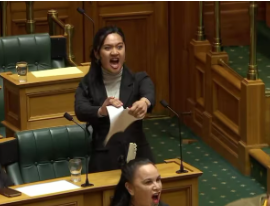Māori Perform Haka in New Zealand Parliament to Protest Treaty Bill
New Zealand’s parliament faced a temporary halt as Māori legislators staged a protest against the Treaty Principles Bill. The protest featured a traditional haka led by Hana-Rawhiti Maipi-Clarke, a young Māori Party MP. This event brought into light tensions surrounding the proposed reinterpretation of the Treaty of Waitangi.
The Haka
The haka is a traditional Māori ceremonial dance, which embodies cultural pride, strength, and unity. Historically, it was performed by warriors before battles or to welcome guests. The performance includes chanting, facial expressions, hand movements, and foot stamping. Different types of hakas exist, each serving various purposes.
Types of Hakas
There are several types of haka in Māori culture:
- Peruperu – A war haka intended to intimidate enemies.
- Ngeri – A short haka designed to boost morale.
- Pōwhiri – A welcoming haka used in ceremonies.
- Manawa wera – A haka performed at funerals to express grief.
The Haka in Parliament
The haka performed in parliament was “Ka Mate,” which was composed by Te Rauparaha, a 19th-century tribal leader. Its lyrics celebrate survival and victory over death. The performance included tearing up a copy of the controversial Bill, symbolising strong opposition.
Treaty Principles Bill Overview
The Treaty Principles Bill seeks to redefine the Treaty of Waitangi. This treaty, signed in 1840, is New Zealand’s founding document. It guaranteed Māori rights to land in exchange for governance to the British. The Bill’s author, David Seymour, argues it would reduce racial divisions.
Criticism of the Bill
Critics argue that the Bill undermines Māori rights, which claim it promotes anti-Māori rhetoric and disregards the treaty’s spirit. Even some coalition members, including Prime Minister Christopher Luxon, have expressed concerns about its implications.
Ongoing Protests
Māori rights groups continue to protest against the Bill. They are organising a 1,000-km march, or hīkoi, to Wellington. This march aims to raise awareness and oppose the proposed changes to the treaty’s interpretation.
Important Facts for Exams:
- Haka: The haka is a traditional Māori dance symbolising cultural pride. It involves chanting and foot stamping. Historically warriors performed it before battles or to welcome guests.
- Ka Mate: “Ka Mate” is a famous haka created by Te Rauparaha. Its lyrics celebrate survival and victory. This haka was performed in New Zealand’s parliament during protest.
- Hīkoi: A hīkoi is a Māori term for a long march. It is used to protest or raise awareness. Currently Māori rights groups are organising a 1,000-km hīkoi to Wellington.
- Treaty of Waitangi: The Treaty of Waitangi was signed in 1840. It is New Zealand’s founding document. The treaty guaranteed Māori rights to land in exchange for governance to the British.
Month: Current Affairs - November, 2024
Category: Art & Culture Current Affairs


